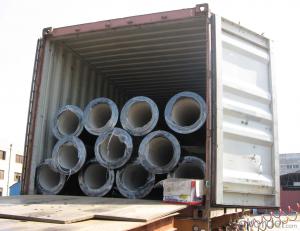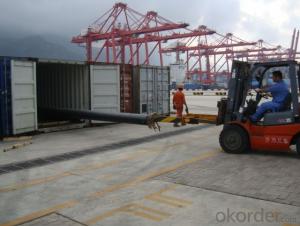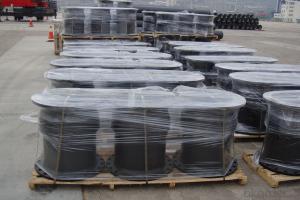DUCTILE IRON PIPES C Class DN900
- Loading Port:
- China Main Port
- Payment Terms:
- TT OR LC
- Min Order Qty:
- -
- Supply Capability:
- -
OKorder Service Pledge
OKorder Financial Service
You Might Also Like
Ductile Iron Cast Pipe is without any defects compare with tradition casting tech, which has many advantages particularly as follow:
(1) High density. In the "vertical upward casting" process, the melt iron of centre liquid column in center crystallizer is continuously feeding for volume shrinkage caused by condensation tube at outer circumference , which lead to be free of shrinkage porosity.
(2) High purity. When melt iron pouring, the mixed impurities such as gas, dross, sand grain which are lighter than melt iron could be eliminated at furnace mouth, its impossible to enter into the crystallizer through the channel, so the melt iron into the crystallizer is very pure.
(3) Strength with toughness. The cooling speed provided by continuous crystallizer is 30 times than sand casting and 5 times than centrifugal casting, and doesn't produce white iron, the eutectic cell volume of continuous cast iron is one eighth to one tenth compare with traditional cast iron. The density of graphite nodule in ductile iron can reach 300-700 pcs/mm2. Therefore, all reason above improve the strength and toughness of continuous cast iron.
(4) Free machining. The high speed cooling make the hardening phase (such as boride, steadite) not appear like reticular, massive or thick, but diffuse like fish bone and pane in shape, moreover, there are tiny graphite flakes inlaid hardening phase. It's free machining in BrinellHardness the range of 250-300HB. However, the Brinell Hardness of 250 is top limit to common metal materials.
(5) Uniform composition of tube wall. The convection mixing of liquid column caused by marching type drawing in crystallizer make the composition of tube wall well-distributed, and concentration gradient very little.
(6) High productivity. To the wall thickness of tube under 10mm, the speed of continuous casting is 1 meter/min, to the wall thickness of tube under 20mm, the speed of continuous casting is 0.5 meter/min, which is high efficiency that centrifugal or other casting tech couldn't reach.
- Q:How do ductile iron pipes handle pipe deflection?
- Ductile iron pipes have high flexibility and strength, allowing them to handle pipe deflection effectively. They can withstand moderate deflection without causing significant damage or compromising their structural integrity. This flexibility is due to the ductile nature of the iron used in their construction, which allows them to bend and adapt to changes in the ground or surrounding environment. Overall, ductile iron pipes are well-suited for handling pipe deflection situations.
- Q:The difference between spheroidal graphite cast iron pipe and HDPE water supply pipe
- (4) HDPE pipes do not need corrosion protection. If the water supply pipeline is made of ductile iron pipe, the inner and outer walls of the ductile iron pipe shall be treated with corrosion protection.(5) the normal service life of the ductile iron pipe is 20~25 years after the pipe is treated by inner and outer walls. The HDPE tube has no corrosion, and the normal service life is 50 years.
- Q:Are there any alternatives to ductile iron pipe for water distribution?
- Yes, there are several alternatives to ductile iron pipe for water distribution. Some common alternatives include PVC (Polyvinyl Chloride) pipes, HDPE (High-Density Polyethylene) pipes, and PEX (Cross-linked Polyethylene) pipes. Each of these alternatives has its own advantages and disadvantages in terms of cost, durability, ease of installation, and resistance to corrosion. The choice of alternative pipe material depends on factors such as the specific requirements of the water distribution system, budget constraints, and local regulations.
- Q:Can ductile iron pipe be used for water supply to remote areas?
- Ductile iron pipe is indeed applicable for providing water supply to far-flung regions. Its exceptional strength and durability render it suitable for transmitting water over long distances. These pipes can endure high pressure and withstand external loads and impacts, making them an ideal choice for rough terrains and remote locations that pose challenges in terms of maintenance and repairs. Moreover, ductile iron pipes are equipped with a protective lining that prevents corrosion and guarantees the safety of the water for consumption. Consequently, ductile iron pipes prove to be an effective and dependable option for water supply to remote areas.
- Q:Are ductile iron pipes more expensive than other pipe materials?
- Yes, ductile iron pipes are generally more expensive than other pipe materials such as PVC or HDPE. However, they offer superior strength, durability, and longevity, making them a cost-effective choice in the long run for applications that require high pressure or corrosive resistance. Additionally, ductile iron pipes have a lower life cycle cost due to their reduced maintenance and repair needs.
- Q:Are ductile iron pipes suitable for water distribution networks?
- Yes, ductile iron pipes are highly suitable for water distribution networks. They possess excellent strength, durability, and corrosion resistance, making them ideal for carrying and delivering water over long distances. Additionally, their flexibility allows for easy installation and adaptability to various terrains, ensuring reliable and efficient water distribution.
- Q:Are ductile iron pipes suitable for underground storage tanks?
- Underground storage tanks can indeed benefit from the use of ductile iron pipes. Ductile iron, known for its strength and durability, exhibits exceptional resistance to corrosion and can withstand the immense pressure and weight associated with burial underground. These pipes find widespread application in various underground systems, such as water and sewage systems, owing to their remarkable tensile strength and ability to handle both internal and external loads. Furthermore, ductile iron pipes boast an extended service life, often surpassing 100 years, rendering them a dependable choice for underground storage tanks. They also possess resistance against ground movement and can adapt to soil settling or shifting, thereby ensuring the integrity and stability of the storage tank system. Moreover, the smooth internal surface of ductile iron pipes provides excellent flow characteristics, preventing the accumulation of debris or sediment that may impede the system. Hence, they prove to be an ideal option for storing a diverse range of liquids or substances. In conclusion, the strength, durability, corrosion resistance, and long service life of ductile iron pipes establish them as a suitable and reliable choice for underground storage tanks.
- Q:Are ductile iron pipes prone to external corrosion?
- Yes, ductile iron pipes are prone to external corrosion.
- Q:Are ductile iron pipes suitable for bridge piers or abutments?
- Ductile iron pipes are indeed appropriate for bridge piers or abutments. This material, known for its strength and durability, is extensively utilized in diverse infrastructure undertakings, such as bridges. It possesses exceptional mechanical characteristics, including remarkable tensile strength and impact resistance, rendering it capable of withstanding substantial loads and external forces. Moreover, ductile iron pipes exhibit high resistance to corrosion and enjoy a lengthy service life, which is crucial for structures like bridge piers or abutments that face harsh environmental conditions. The adaptability and dependability of ductile iron pipes deem them a fitting choice for supporting and fortifying bridge structures, ensuring their safety and longevity.
- Q:Can ductile iron pipes be used for gas distribution systems?
- Yes, ductile iron pipes can be used for gas distribution systems. Ductile iron pipes are known for their strength and durability, making them suitable for carrying various types of fluids, including natural gas. These pipes have excellent corrosion resistance and can withstand the high pressure and stress typically associated with gas distribution systems. Additionally, ductile iron pipes are cost-effective and have a long lifespan, making them a reliable choice for gas distribution networks.
1. Manufacturer Overview |
|
|---|---|
| Location | |
| Year Established | |
| Annual Output Value | |
| Main Markets | |
| Company Certifications | |
2. Manufacturer Certificates |
|
|---|---|
| a) Certification Name | |
| Range | |
| Reference | |
| Validity Period | |
3. Manufacturer Capability |
|
|---|---|
| a)Trade Capacity | |
| Nearest Port | |
| Export Percentage | |
| No.of Employees in Trade Department | |
| Language Spoken: | |
| b)Factory Information | |
| Factory Size: | |
| No. of Production Lines | |
| Contract Manufacturing | |
| Product Price Range | |
Send your message to us
DUCTILE IRON PIPES C Class DN900
- Loading Port:
- China Main Port
- Payment Terms:
- TT OR LC
- Min Order Qty:
- -
- Supply Capability:
- -
OKorder Service Pledge
OKorder Financial Service
Similar products
New products
Hot products
Related keywords




























